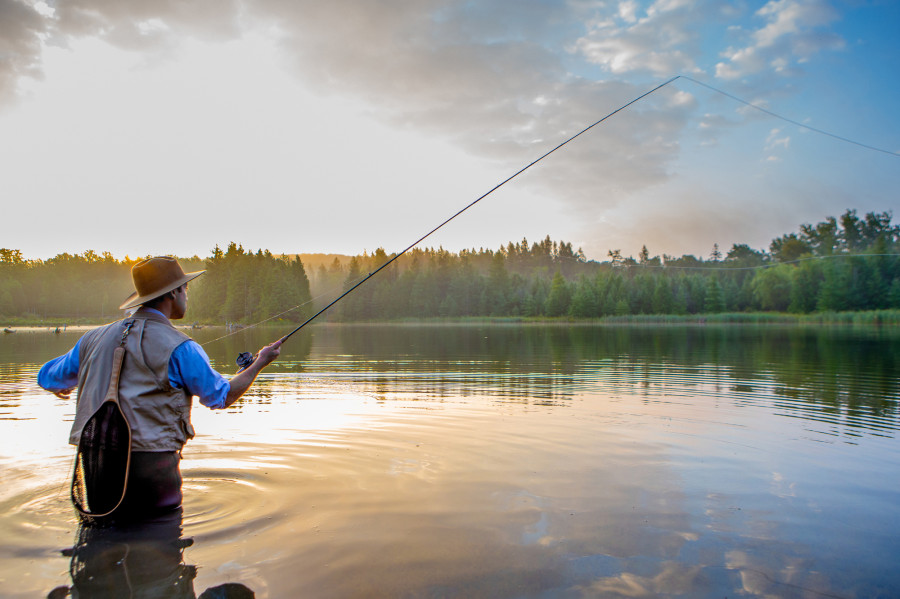Columns
Fishing helps relax the mind
The activity reminds us that we are the descendants of hunter-gatherers.
Pramod Mishra
I just returned from a 10-day vacation that turned out to be a fishing trip. Life-threatening illnesses and the deaths of friends and colleagues since January of this year, combined with my own routine work, had sapped my energy, exhausted my inner resources and made me sick and tired of my surroundings. Even my garden, which I could start only in the second week of June due to incessant rains and extended low temperatures, couldn’t regenerate my energy. I felt that I must get away to the ocean, away from the humdrum of life and work.
Whenever I visit the Atlantic coast during the summer, I do two things for recreation: play with the waves and go fishing. This time, though, the winds were so strong and the east-to-west winds brought so much cold water that the temperature of the water-dipped to around 15 degrees Celsius. And when I moved to a southern island by a hundred miles, the winds kept blowing so hard that getting into the water proved to be as big a challenge as wrestling with a mighty giant. In fact, in the beaches of Cape Fear in North Carolina, a father of six got hammered down by the waves so hard that he broke his neck and died.
I consider myself lucky that I suffered only mild dislocation of my right shoulder. But the trip was, on the whole, successful because I was able to pursue my other hobby—fishing. Before leaving for the coast, I had bought a surfcasting fishing rod and reel, among others. In the face of the strong winds, even the surfcasting rod, reel and leaders didn’t work, let alone the fly fishing equipment, which requires gentler surroundings, like creeks and pools of calm waters in rivers. That’s why fly anglers flock to the rivers of Wyoming and Montana in the western United States. But I was on the barrier islands of North Carolina called the Outer Banks. So, like any experienced angler, I had to improvise, gather information about local conditions from other anglers I saw fishing and especially from local tackle shops. I had to buy a new medium heavy rod and reel and a number of lures that imitated baitfish rather than flies because if creek and small river fish feed primarily on flies and insects, the saltwater fish feed on other fish and marine life.
When I was in graduate school, I used to spend about two weeks every summer camping and fishing in the Outer Banks. Fishing and gardening, besides forms of exercise such as swimming, walking, tennis and now biking, have over the years helped me cope with the stresses and strains of a challenging life. In this sense, I consider myself fortunate that I grew up in a Rajbanshi village where I watched my villagers gardening for vegetables, went fishing with bamboo stick poles, cotton thread and Buchchi’s fish hooks (Buchchi was an itinerant trader of dry goods who also sold hooks and threads in the village bazaar). And the physical sports like Kabbadi I played with the herd boys—all came back to me in my thirties when life circumstances began to be overwhelming. I taught myself tennis, a difficult game to learn as an adult, and freestyle, backstroke and breaststroke swimming. And my childhood efforts at swimming in a swollen creek in the monsoon season came back to me. But learning them in their modern ways took much effort and persistence.
Like everything else in the United States, fishing, whose gentleman name is angling, is a complex art but also a billion-dollar industry. More than need, which drove me and my villagers to fish in the autumn creeks, marshes and whirlpools after the flooding season was over, fishing is a sport in the United States that people participate for recreation. And even here, one can find a simple fisherman who uses a cheap rod, reel and lines with worms as bait, as opposed to anglers who spend hundreds of dollars for fishing rods, lures and braided lines. Then each variety of fish requires different kinds of lures, rods and lines. Topwater lures versus deep-water lures; bait caster rods and reel versus spinning rods and reels; walleye fishing versus bass fishing versus bottom feeder (catfish and carp) fishing. One can cast one’s line and wait for fish to take the bait, as carp and catfish do. Otherwise, one can go after the fish by constantly casting the lures near the fish and playing the lure to entice the predatory fish. And then there is a whole different more expensive, sophisticated and gentler world of fly fishing which I have just begun to learn. If you are a serious fly angler, you need to have waders and wading boots that can cost you up to a thousand dollars; the rod and reel might cost you up to a couple of thousands.
Then, there is saltwater fishing. I did fish on the sound side from the jetty of rocks and caught a few speckled sea trout, among other fish, but because of the strong winds, I couldn’t surfcast this time. And I engaged the services of a seasoned guide to take me to the sound and inlet where we caught, mostly through trolling rather than casting, quite a few bluefish and Spanish mackerel. And due to severe winds, I couldn’t go deep-sea fishing in the Gulf Stream for marlin, wahoo and mahi-mahi, which would have been the climax of my fishing trip. Fishing for me is a stress reliever. I like to eat the fish I catch if it’s from unpolluted water. But more than anything else, fishing for me is to be in nature for hours at a time. While I’m fishing, I forget the world and its worries. Like gardening, being near or in the water heals my soul and purges my negative emotions. As a side benefit, I get to eat fresh fish and remind myself that I am, after all, despite all the trappings of hierarchies and civilization, a descendant of hunters and gatherers.




 9.89°C Kathmandu
9.89°C Kathmandu















